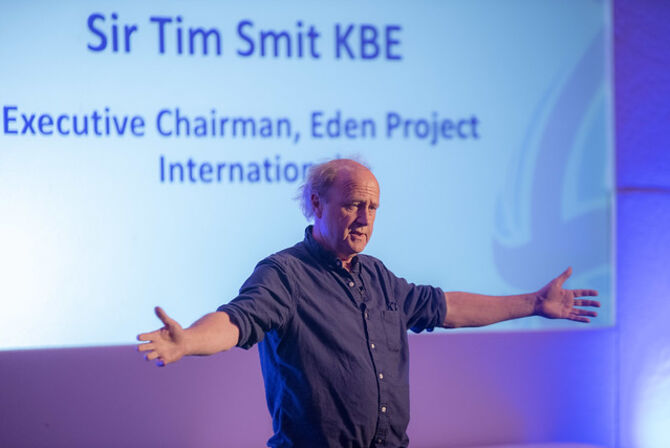COBIS Conference report
The 38th Annual COBIS Conference took place between 11-13 May, in the business-like surroundings of the InterContinental Hotel at the 02 in London. Relocate magazine visited the conference and reports on just some of the highlights.

COBIS Patron’s Accreditation and Compliance schemes
Gary Minnitt, Assistant Director of Accreditation, announced extensions to the COBIS Patron’s Accreditation and Compliance schemes, first introduced in 2017, which aim to improve the standard of schools using a process of self-evaluation, with expert guidance from trained and informed school improvement partners and peer accreditors, who visit aspiring member schools over a five-year cycle. So far over 100 schools have been visited, with 37 improvement partners appointed and 179 peer accreditors trained. Schools are constantly being added to the scheme with the latest including British/Chinese bi-lingual / dual curriculum schools.Supporting Member of the Year Award
Mr Minnitt also announced the winner of the COBIS Supporting Member of the Year Award which this year went to Blue Sky Education at Saint Paul’s School for what he described as, “a fantastic piece of software” designed to review how the school’s teams had developed their working relationships. Break-out sessions over the three days covered a wealth of subjects with wellbeing and mental health, safeguarding children and leaderships issues being just some of the many topics covered.Realising the potential of artificial intelligence for education
Keynote speakers over the course of the three days included Professor Rose Luckin of UCL whose presentation: Realising the potential of artificial intelligence for education: 3 routes to impact, explored the use of AI to predict behaviours in order to improve services and save money. Professor Luckin described data as, “the new oil and, like oil, data is crude and must be refined in order to derive its value. It must be ‘cleaned’ before it can be used by AI.”She cautioned that educators must be wary of words and images being manipulated and that while, “data is the power behind AI, educators should engage about exactly what AI should and should not be doing”. Her research at UCL has involved working with over 200 companies in the last two years to establish what she described as ‘The Golden Triangle’, partnerships between academic researchers, teachers and learners and Edtech developers in order to achieve the ultimate goal of, “AI and HI complementing each other”.Imagine if robots ran schools
The use of AI to complement education was also the topic of the presentation given by Priya Lakhani OBE, founder of Century Tech, which uses AI to provide a personalised learning platform to students, while simultaneously providing insights and analysis to their educators in order to refine and improve the education being given to individual students.Ms Lakhani’s talk was entitled: Imagine if robots ran our schools. Outlining a number of statistics, including the fact that 60 per cent of teachers’ time was spent doing admin, while 20 per cent of students are not performing in the way that their teachers would like them to, had lead her to the inevitable conclusion that the, “the one size fits all delivery in education is inadequate” and that the reality of the “factory model of education – knowledge versus skills” was not accurate as, “they are not mutually exclusive”. Ms Lakhani went on to explain that the technology used in the Century Tech learning platform is designed to look for patterns and correlations as the machine itself learns from the data. The combination of AI with neuroscience and learning science is designed to give each child an individual learning path as the machine tracks how a child is learning and is able to pick up if they are struggling. “AI can remedy misconceptions and provide recommendations – that is the power of technology,” she said. She concluded that while it was her aim to, “empower every child and every teacher” she also recognised that robots would not end up running our schools as, “the most important person in the classroom is the child, but the most powerful is the teacher”.Sir Tim Smit
The conference was closed by the charismatic Sir Tim Smit, KBE, founder and Executive Chairman of the Eden Project. Although officially entitled: The issue is not what sort of planet we are leaving our children, it’s what type of children are we leaving our planet, Sir Tim’s highly entertaining talk covered an array of topics and ideas obviously close to his heart, including the observation that, “Scientists are more obsessed by what their peers think. It will be stories that change the world, not one more scientific fact.”However he went on to conclude that, “Teaching is the highest possible calling there is,” and that, “the next generation are really rather crucial. The future is coming unbelievably fast and a lot of young people want change. The future still remains ours to make.”Subscribe to Relocate Extra, our monthly newsletter, to get all the latest international assignments and global mobility news.Relocate’s new Global Mobility Toolkit provides free information, practical advice and support for HR, global mobility managers and global teams operating overseas. Access hundreds of global services and suppliers in our Online Directory
Access hundreds of global services and suppliers in our Online Directory
©2025 Re:locate magazine, published by Profile Locations, Spray Hill, Hastings Road, Lamberhurst, Kent TN3 8JB. All rights reserved. This publication (or any part thereof) may not be reproduced in any form without the prior written permission of Profile Locations. Profile Locations accepts no liability for the accuracy of the contents or any opinions expressed herein.






































